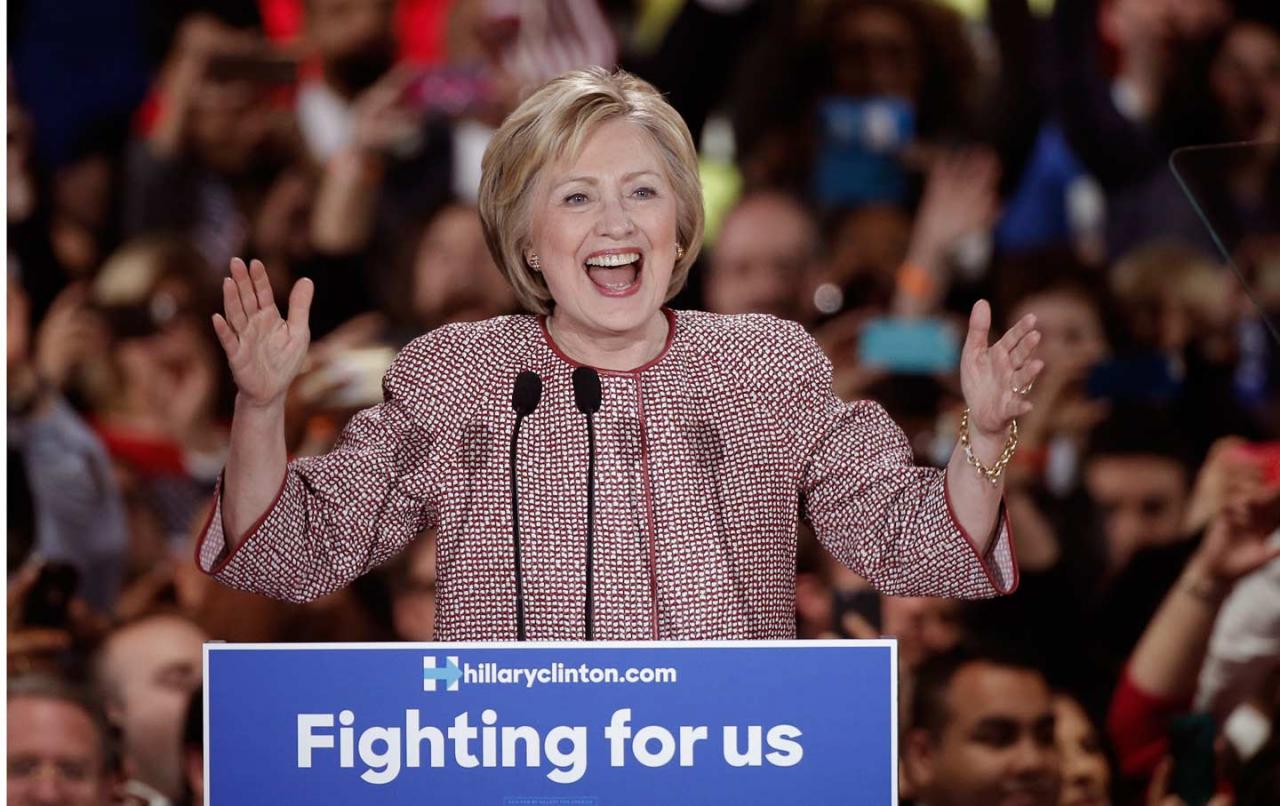
Hillary Clinton reacts as she arrives onstage at her New York presidential primary-night rally in Manhattan, April 19, 2016. (Reuters / Mike Segar)
New York—By noon, when it became clear they were going to fall short, the Sanders campaign was already trying to spin another moral victory, arguing that, given the stacked deck of New York politics, a single-digit loss showed a tightening race, while a loss of under five points—by that point, the outer limit of their hopes—meant that Sanders was really still on a roll. It wasn’t true even then. To keep his slim chance of becoming president alive, Sanders needed to win New York. In the end, it wasn’t even close.
Instead, Hillary Clinton won by a margin convincing enough to keep her comfortably on the path to victory at the convention in Philadelphia. Sanders supporters will have to console themselves with the knowledge that it was their candidate who won the battle of ideas in New York, as he has in previous states.
Whether it was Clinton’s sharing the podium with Andrew Cuomo when he signed the law setting a $15 minimum wage, her grudging acknowledgement in the Brooklyn debate that “the Palestinian people had the right to self-government,” or her commitment, in her victory speech, to rebuilding America’s crumbling cities—time and again the Sanders challenge has forced Clinton off dead center. Sanders’s supporters can also take comfort in the certainty that it is they—the millions of $27 donors—who represent not only the future of the Democratic Party but the only hope for democracy in this country.
Yet we need to pause and acknowledge the heartbreak. Because Bernie Sanders might have actually won New York—a progressive state whose progressive coalition splintered, largely on racial lines. Once again voters of color—particularly in New York City—gave Clinton not just a firewall but a fortress that Sanders couldn’t breach. And here it’s time to admit that while Sanders needed more time, he also didn’t try nearly hard enough.
Would it have made a difference if Sanders, the white candidate from a white state, had made a direct appeal to black and Latino New Yorkers—if he had devoted a whole speech to the kind of home truths on race, from the other side of the color line, that candidate Barack Obama delivered eight years ago in Philadelphia? Or if, instead of letting his surrogates introduce him in a town-hall meeting at the Apollo, he had really introduced himself, and explained where his record on racial justice differed from Clinton’s—not just at the Apollo, but at Brooklyn College, or Medgar Evers College, or in churches in Harlem and Bedford-Stuyvesant?
We’ll never know. Just like we’ll never know why the campaign put Spike Lee on the stage in Greenwich Village but left him off in Brooklyn, or whether the addition of a hip-hop band might have made for more diverse and larger audiences in both Washington Square and Prospect Park. What we do know is that New York’s mix of ethnic diversity and insatiable tabloid media have been tripping up national candidates for decades—and that Hillary Clinton definitely made the most of her home-field advantage.
Does the New York result mean Sanders should pack up and quit? Of course not. The spark that caught fire with his campaign will burn all the way to California—to the convention, the election, and beyond. But he—and those of us who allowed ourselves to hope he might really be president—need to start asking some questions.
If Sanders isn’t running for president, what is he running for? How will he—and we—sustain the political revolution past November? Is the goal to occupy the Democratic Party—and go into the convention seeking real influence over the platform? Is it more important to get Sanders supporters into positions of power within the party? Or are both of those approaches distractions from the long-term goal of building institutional power independent of a party that has always been quick to co-opt movements but deeply reluctant to deliver radical change?
In the short term, Sanders needs to keep setting out what he’s fighting for: not just the policies he will probably never be in a position to implement, but the politics he’s already done so much to transform. And though it might seem like a restriction to lay off the personal attacks, and to rein in those of his supporters who see Hillary Clinton as the incarnation of evil, it could also be a liberation.
As he rightly reminds us, when Sanders began he was barely a blip in the national polls. It was his vision of what this country could become if we freed our politics from the shackles of corporate money and our policies from the straitjacket of neoliberal orthodoxy that brought him so many victories. If he spends the next three months talking more about that vision, and less about his opponent, will that really be such a great loss?














